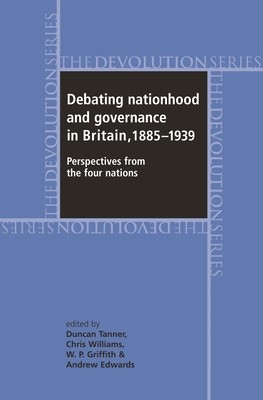
- We will send in 10–14 business days.
- Publisher: Manchester University Press
- ISBN-10: 0719071674
- ISBN-13: 9780719071676
- Format: 15.6 x 23.4 x 1.5 cm, softcover
- Language: English
- SAVE -10% with code: EXTRA
Debating Nationhood and Governance in Britain, 1885-1939 (e-book) (used book) | bookbook.eu
Reviews
Description
This book is the first in-depth study of the debates over devolution in the four nations of the UK in the period up to 1939. It explores divergent trends and attitudes towards the principle of devolution at both local and national (UK) levels, explains the limitations of devolution as a political ideal and the inherent contradictions in the debates over devolution which were unresolvable in the period under study. The book also demonstrates the enduring potency of an all-British context and of the influence and power of those who wished to defend the status quo. It investigates the role of national - and Imperial - identities in the debates over devolution, highlighting the continuing value and importance of 'Britishness' and British identity as vital factors in moulding popular opinion and support for established systems of governance. In so doing, the book offers fresh perspectives on the development of nationalisms in the 'Celtic fringe' during this period and demonstrates the problems and limitations of such identities as ways of mobilizing political opposition.
EXTRA 10 % discount with code: EXTRA
The promotion ends in 16d.02:04:07
The discount code is valid when purchasing from 10 €. Discounts do not stack.
- Publisher: Manchester University Press
- ISBN-10: 0719071674
- ISBN-13: 9780719071676
- Format: 15.6 x 23.4 x 1.5 cm, softcover
- Language: English English
This book is the first in-depth study of the debates over devolution in the four nations of the UK in the period up to 1939. It explores divergent trends and attitudes towards the principle of devolution at both local and national (UK) levels, explains the limitations of devolution as a political ideal and the inherent contradictions in the debates over devolution which were unresolvable in the period under study. The book also demonstrates the enduring potency of an all-British context and of the influence and power of those who wished to defend the status quo. It investigates the role of national - and Imperial - identities in the debates over devolution, highlighting the continuing value and importance of 'Britishness' and British identity as vital factors in moulding popular opinion and support for established systems of governance. In so doing, the book offers fresh perspectives on the development of nationalisms in the 'Celtic fringe' during this period and demonstrates the problems and limitations of such identities as ways of mobilizing political opposition.


Reviews